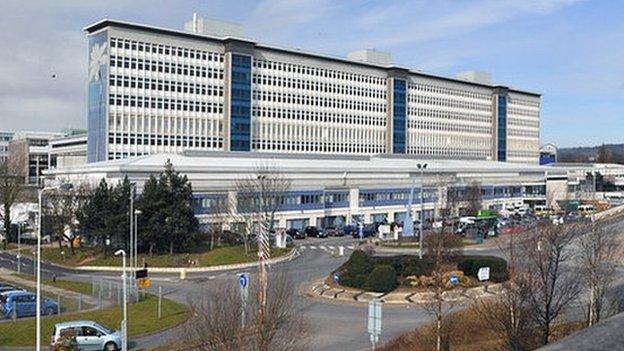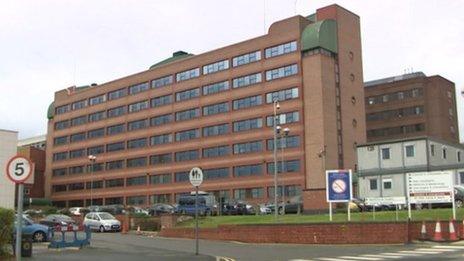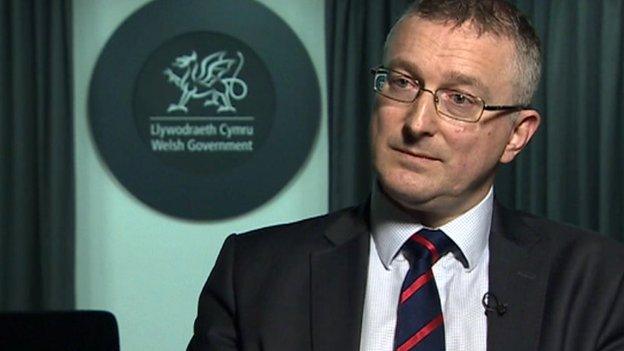'Think' plea to avoid A&E winter crisis in Wales
- Published
Chilly weather helps illnesses spread - and there are more emergencies
People with minor injuries and illnesses have been urged not to clog up accident and emergency units in a bid to avoid another winter pressures crisis.
NHS Wales' chief executive said 80% of patients who went to A&E did not need admission or follow-up treatment.
Pressures in Wales' busiest A&E units last winter led one senior nurse to compare them to a war zone.
A Choose Well campaign has been launched by NHS Wales.
The winter months put added pressure on the health service as illnesses spread and colder weather leads to a rise in slips, falls and car crashes.
Dr Andrew Goodall said: "The vast majority of medical conditions do not need emergency care.
Dr Andrew Goodall: The vast majority of medical conditions do not need emergency care"
"We have one million people who attend our A&E departments [each year].
"But we already know that people don't need to attend - around 80% of people who walk through the front door will not need follow up treatment or admission to a hospital environment."
He said lives could be put at risk this winter if patients do not think more carefully about how they use the health service.
And inappropriate use of A&E departments and non-urgent calls to the Welsh Ambulance Service had "a real impact".
Limited bed availability, longer stays in hospital and patients "not getting the right care at the right time" will all be issues, he predicted.
Dr Goodall told BBC Wales that when people are injured or unwell "it does start with them looking after themselves".
"We really need people to focus on the fact that they can choose other services, nearer their communities, pharmacies in the high street and even NHS Direct."
But the Royal College of Emergency Medicine (RCEM) said it strongly disagreed with the suggestion that 80% of those attending A&E need not be there.
It said its own research found around 15% of A&E patients could be more appropriately seen by a GP or a pharmacist, for example.
"The College also disagrees that the way to ensure patients receive the best care is to encourage patients to avoid A&E," said a spokesperson.
"Such a strategy in our view will only work where there is significant alternative capacity in primary care where we know there is also significant pressure."
Shadow Conservative health minister Darren Millar AM said it was wrong to blame patients for turning up at A&E.
"Whilst there are some patients who are irresponsible in the way that they use our emergency departments, the overwhelming majority do so either because they can't access other services or because they are genuinely concerned that they need urgent medical attention," he said.
The NHS in Wales
A day in numbers
2,000
seen in accident and emergency
-
2,400 discharged from hospital
-
10,000 x-rays carried out
-
890 999 calls responded to
-
12,000 outpatient appointments
Choose Well wants patients to only go to A&E or to dial 999 if they have a life-threatening condition which needs immediate medical attention.
These include:
Persistent or severe chest pain
If someone is choking or blacking out
Major blood loss which can't be stopped
Someone has suffered a suspected stroke
Dr Goodall added: "This is your NHS. It is your responsibility not to put lives at risk but to think and choose well what - if any - service you really need."
Last winter, bosses at Cardiff's University Hospital of Wales - Wales biggest - called the pressures "relentless" and "unprecedented".
It led to routine surgery being cancelled and extra staff were called in.
More complex illnesses involving elderly patients and the earlier onset of flu were two of the reasons cited as well as people going to A&E when they could have been treated at home or in the community.
- Published18 February 2015
- Published13 January 2015

- Published30 December 2014

- Published16 December 2014
